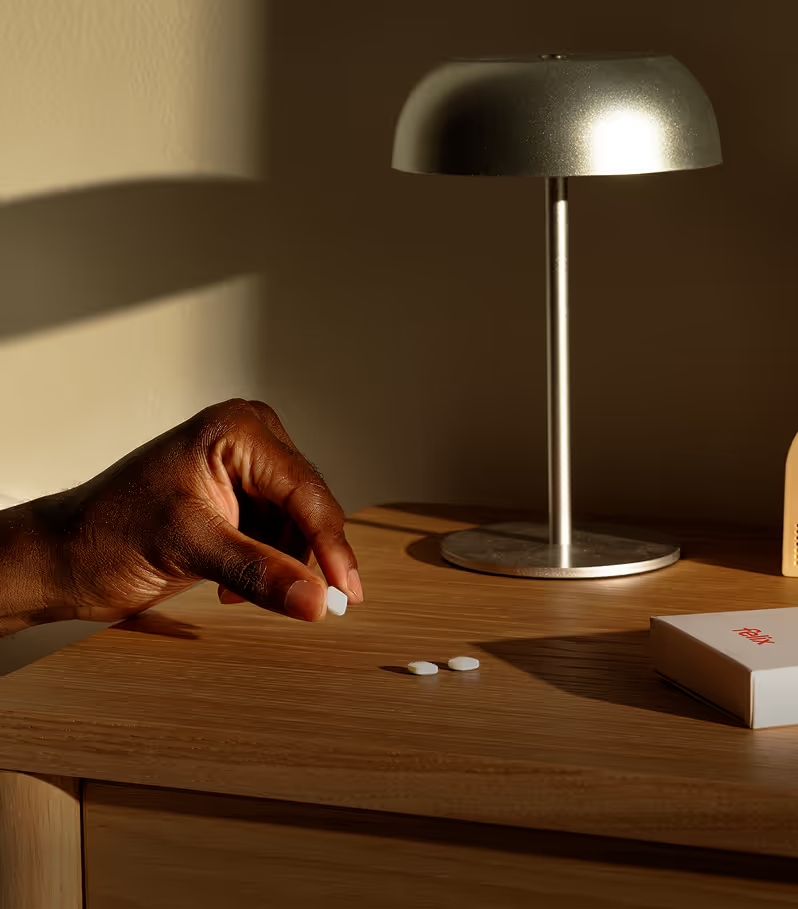Download the Felix App
Earn reward, visit our shop and get exclusive offers on the app
Download nowEarn reward, visit our shop and get exclusive offers on the app
Download nowPut your health first in 2026 with free visits on all categories, and $200 off longevity testing.
Download nowPut your health first in 2026 with free visits on all categories, and $200 off longevity testing.
Download now
AI-generated summaries may be inaccurate and do not constitute medical advice. Third-party AI tools are not under Felix's control, and your use of them is at your own risk.
We'll review the relationship between the birth control pill and migraines, how it can help sufferers, and who should avoid taking it due to the potentially dangerous health risks.
A migraine is a headache that can appear as a throbbing pain on the side of the head. Migraines can vary in how severe they are, ranging from moderate to severe.
For many sufferers, migraine episodes accompany other symptoms besides headaches, such as nausea and sensitivity to sound and light.
Migraines are more common in women, likely due to monthly fluctuations in hormones that women experience. This helps explain why birth control pills, which reduce the change in hormones, can provide relief from migraine headaches.
Migraines can be triggered by various things, including dramatic hormonal changes. Women's hormones fluctuate throughout the month, including a significant drop in estrogen right before the period. These hormonal fluctuations may be why women experience migraines at a higher rate than men, with about 15% of Canadian women suffering from this type of headache.
So, what role does the pill have in migraine treatment? Combination pills are a form of hormonal birth control, containing two female hormones: an estrogen hormone and a progestin hormone.
Taking the pill maintains steady levels of estrogen throughout the cycle, preventing the spike that causes ovulation. By keeping estrogen steady, the pill can also prevent the sharp drop in estrogen that occurs before the menstrual cycle begins.
Since that drop in estrogen is a frequent trigger of migraine headaches in those who are prone to them, taking the pill can prevent the initial trigger from taking place, reducing the incidence of migraines.
However, some types of migraines come with additional risks that can be made worse by the pill. To understand how this works, it helps first to understand the two different categories of migraine: migraine with aura and migraine without aura.
Migraines with aura are also sometimes called complicated migraine, and they're less common than migraines without aura. They are distinguished by symptoms in addition to headaches which can include:
People who experience migraines with aura usually have these symptoms in advance of a migraine, and they can last up to half an hour.
Those who get migraines with aura are also at higher risk of blood clots and stroke than people who get migraines without aura.
The increased risk of blood clots and ischemic stroke and blood clots for women who experience migraines with aura makes hormonal birth control a potentially risky choice, but every situation is unique, so it’s best to consult with a healthcare practitioner to see if this is an option for you.
This risk isn't significant in those without preexisting conditions, but for some people who get migraines with aura, the risk may be high enough that hormonal birth control options like the pill are not the best choice. Many studies have established a higher risk of stroke in those who suffer from migraines with aura, including a 2010 meta-analysis from The American Journal of Medicine that compounded the findings from 21 studies and found a 2.3-fold increase in strokes in this population. The frequency of migraines with aura may also impact an individual’s risk.
Birth control pills today contain lower doses of estrogen than they did in the 60s and 70s, which has reduced the danger they pose for causing blog clots and strokes. For most healthy people who don't smoke, the concern is minimal.
However, even at these lower doses, your healthcare practitioner might recommend alternative birth control methods.
Luckily for those who get migraines without aura, this significantly increased risk of stroke doesn't apply to them. This means that they can generally safely benefit from the preventative effect of the hormones in oral contraceptives.
Migraines without aura can still be accompanied by some additional symptoms, such as light sensitivity, nausea, and vomiting. However, they are not accompanied by the visual disruptions that characterize auras, such as flashing lights. They also lack the face and hand numbness that can be a part of migraines with auras.
If you get migraines with aura, your doctor may advise against using combination oral contraceptives as birth control. The increased risk for blood clots and stroke is often deemed too great.
Most hormonal birth control won't be appropriate because it comes with the same risks as the combination birth control pill. This means that hormonal IUDs, contraceptive implants, and contraceptive patches will carry the same risks.
However, there are multiple alternative non-hormonal birth control options available to prevent unwanted pregnancies safely:
Some people may experience migraines with aura and can still take a combination hormonal birth control, but only a healthcare practitioner can determine if this applies to you.
Menstrual migraines can occur in both those who experience migraines with aura and those who experience migraines without aura. In either case, the migraine is caused by hormonal fluctuations associated with the menstrual cycle.
Estrogen rises steadily until the point of ovulation when an egg is released, then begins to drop. Shortly before the period begins, it drops significantly. The journal Therapeutic Advances in Neurological Disorders identifies this hormonal shift as being responsible for migraines in over half of women who get them.
The symptoms of a menstrual migraine often begin a few days before menstruation begins. They can last anywhere from several hours to a few days.
Menstrual migraines are just one type of migraine, although a common one in women who get migraines. Other kinds of migraines can occur without any relation to the hormonal fluctuations of the monthly cycle.
If a migraine is indeed caused by hormonal fluctuations, as menstrual migraines are, then hormonal birth control can help. Since hormonal birth control, including the pill, release artificial versions of the female sex hormones estrogen and progestin, they suppress your natural production of these hormones.
The natural production of estrogen and progestin varies throughout the menstrual cycle, while most oral contraceptives and other hormonal birth control options release a steady amount of hormones throughout the cycle. In this way, they prevent the sharp drop in estrogen levels that can trigger menstrual migraines.
Most birth control pills come in packs of 21 or 28, with 28 packs containing 21 active pills and 7 placebo pills to keep you in the habit of taking them. However, there are also continuous or extended cycle pills available which can be taken for longer without a pause in between. Even regular birth control pills are generally safe to take continuously without a pause. This maintains a steady level of hormones, which can prevent migraine attacks.
While those who get menstrual migraines with aura would also experience this preventative effect, the risk of stroke associated with taking these types of birth control is generally considered too high.
Many women can safely use hormonal birth control, but there are some additional risk factors, in addition to experiencing migraines with aura, that should be considered before starting. These include:
Since hormonal birth control is prescription-only in Canada, your doctor will likely ask you some routine questions when you get a prescription. They will want to know your current health status, medical history, and possibly your family medical history if it is relevant, such as a family history of breast cancer.
If you have experienced migraines in the past, even if you're not sure if they were menstrual migraines or if you experienced aura with your migraine, make sure to let a healthcare practitioner know so they can assess if hormonal birth control is safe for you.
Other questions you may want to raise with your doctor include:
A healthcare practitioner will be able to consider your unique situation when answering your questions.
With so many different kinds of birth control out there, including many varieties of the pill, it's normal to have plenty of questions before determining which is right for you. This is especially true if you suffer from migraine headaches because of the increased risk of stroke. Here are answers to some of the most common questions that come up.
Birth control can make migraines worse in some people. Even though it can help to prevent menstrual migraines in some women, it can also surprisingly make these events worse for others. The chance of this happening is likely related to the amount of estrogen in the hormonal birth control being used and whether it is being used continuously or with a pause. Since the rapid decline in estrogen right before menstruation can trigger a migraine, the week off of hormonal birth control pills may have a similar effect in some users.
You can take birth control if you have migraines provided that they are not migraines with aura. If you experience migraines with aura, a healthcare practitioner will likely recommend something other than oral birth control and other hormonal forms of birth control. There is one type of pill which may be safe for you to take if you get migraines with aura, and that is the progestin-only pill, also known as the mini-pill.
Yes, migraines can be hormone related. There are a variety of potential triggers for migraines, including certain foods, but for many women, there is a connection between the hormonal cycle and the incidence of migraines. These are sometimes referred to as menstrual migraines. In these cases, provided they don't occur with ara, taking some types of hormonal birth control can help.
For more information about birth control, speak to a healthcare practitioner at Felix about your options today.
Medically reviewed by
References




























